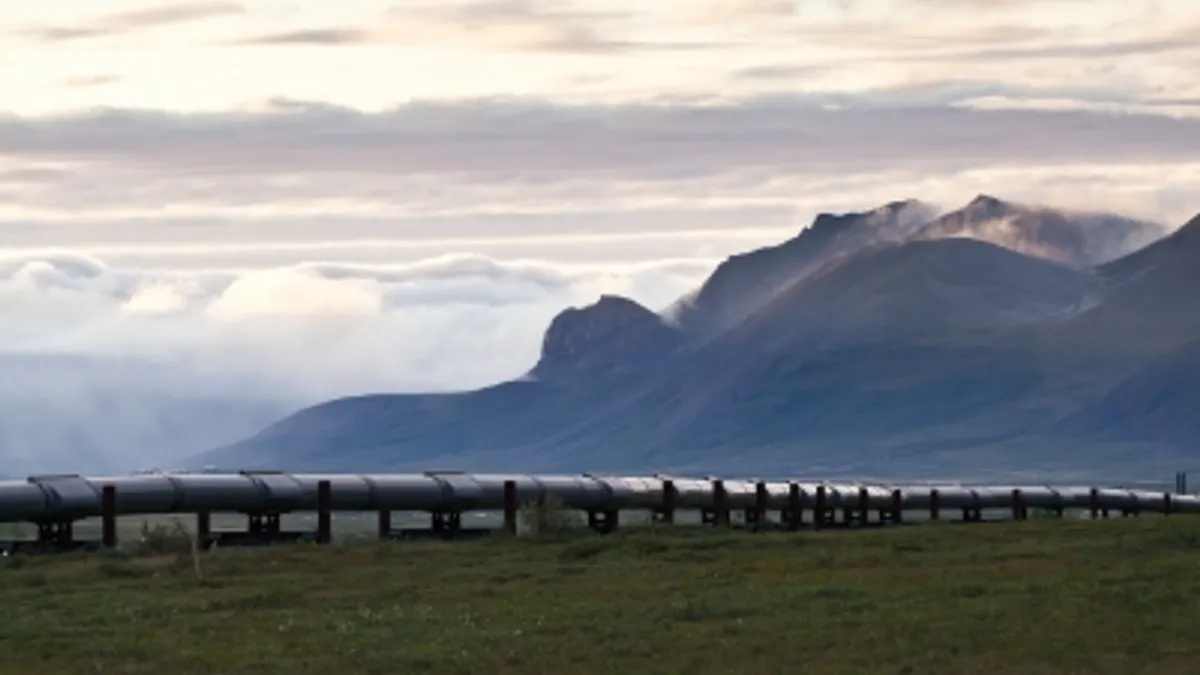Dive Brief:
- The U.S. Court of Appeals for the District of Columbia Circuit on Wednesday declined to review an August decision that held the Federal Energy Regulatory Commission did not properly assess greenhouse gas emission impacts of a $3.5 billion pipeline.
- The ruling could put a stop to construction of the planned 515-mile Sabal Trail Pipeline from Alabama to Florida when the court issues its formal mandate on the decision, expected next week. The route forward for pipeline backers is unclear, but FERC will likely have to finalize a new impact statement on greenhouse gas impacts from the pipeline.
- The decision represents a significant legal rejection of FERC's approach to pipeline approvals, which does not take into account expected climate impacts. FERC has argued that existing climate models are "not reasonable" for project-level analysis.
Dive Insight:
Just as FERC keys up for its first review of pipeline approval policies since 1999, the D.C. Circuit this week reiterated a wholesale rebuke of the agency's approach to GHG accounting.
In August, the court rejected FERC's approval of the Southeast Market Pipelines Project, a three-pipeline project including Sabal Trail. Judge Thomas Griffith wrote that FERC should have given a "quantitative estimate" of the GHG impacts of burning the gas transported by the pipelines, or explain more specifically why it cannot.
Such a decision would typically cancel out FERC's construction approvals, but the agency and pipeline owners asked the court for a rehearing, which held the permits in place.
On Wednesday, a two-judge panel denied that request and the rest of the D.C. Circuit judges declined to get involved. That means Sabal Trail's permits will be voided when the court issues its formal mandate on the decision, which typically happens seven days after publication.
FERC could reinstate the permits by issuing a Supplemental Environmental Impact Statement (SEIS) that it feels better accounts for GHG impacts of the project. That would allow construction to begin again, but environmental groups could file a new court challenge if they feel the analysis does not adequately account for climate impacts.
FERC issued a draft SEIS for comment at the end of September explaining why it "could not find a suitable method to attribute discrete environmental effects to GHG emissions." Both the federal government's Social Cost of Carbon tool, developed under the Obama administration, and atmospheric models used by the United Nations and NASA are "not reasonable for project-level analysis," the commission wrote.
"The [Social Cost of Carbon] tool may be useful for rulemakings or comparing regulatory alternatives using cost-benefit analyses where the same discount rate is consistently applied," FERC wrote. "[H]owever, it is not appropriate for estimating a specific project’s impacts or informing our analysis under the [National Environmental Policy Act]."
It remains unclear how close FERC is to completing the supplemental EIS, as well as how judges would react to a document like the draft that does not provide more specific carbon impact information. An agency spokesperson told E&E News the document and an accompanying FERC order are "pending final decisions."
The ruling comes as FERC prepares a review of its policies regarding pipeline approvals, announced in December by Chairman Kevin McIntyre. Since then, the two Democratic members of the commission have raised questions about how FERC judges the need for new pipelines, and the D.C. Circuit ruling on carbon accounting could add a new layer to the debate.
Environmental groups say that pipeline review should include more detailed climate assessments. In a statement, the Sierra Club, which brought the court challenge against Sabal Trail, said the pipeline should shut down because its threats have not been fully considered.
"The court already rejected FERC's failure to consider the greenhouse gas pollution from burning the gas transported by the pipeline," Sierra Club Staff Attorney Elly Benson said. "It's time this dirty, unnecessary pipeline is shut down unless and until FERC conducts a comprehensive review of its climate impacts."














